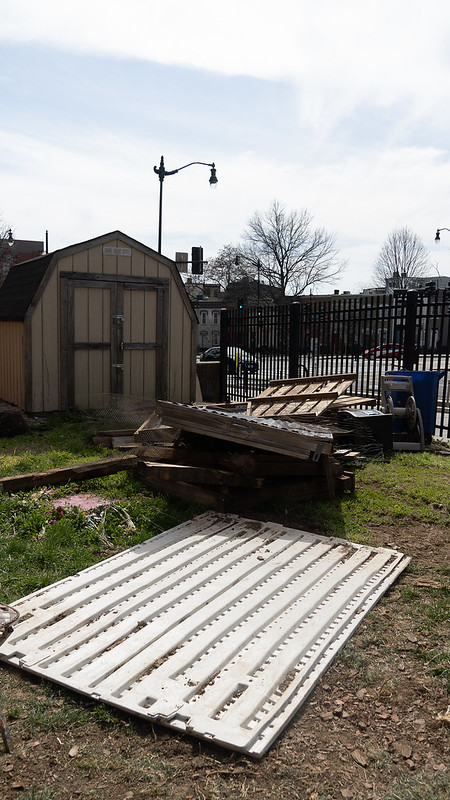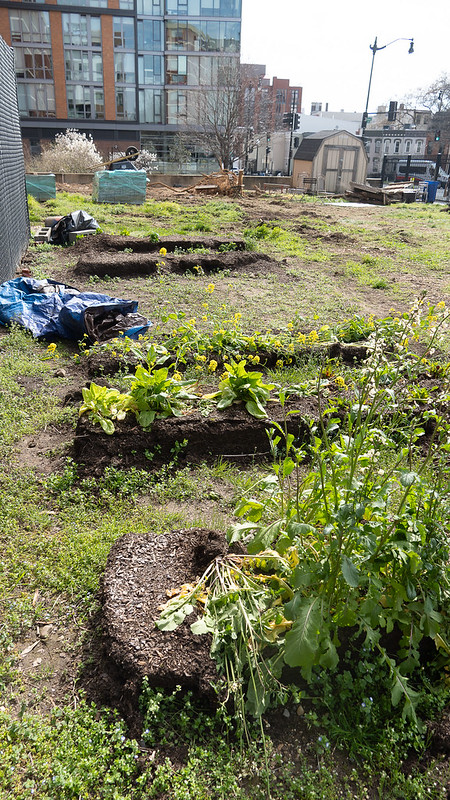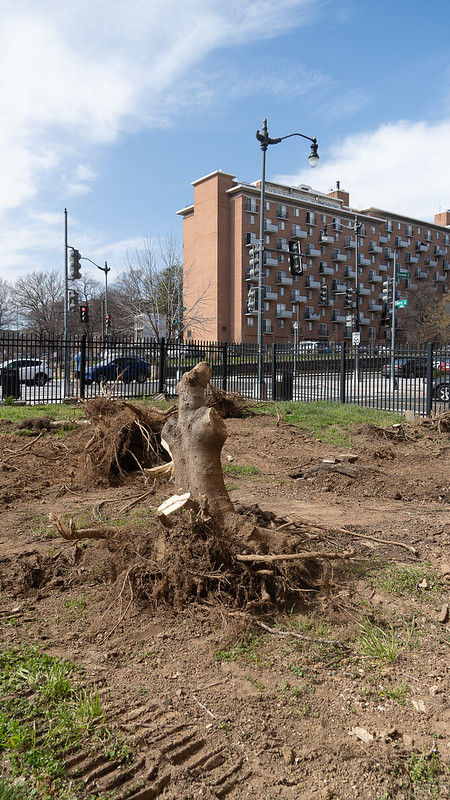
Zoe Coker was awoken from a nap when her friend called her to share the news: the Howard University student-run garden had been demolished.
Members of the Howard University Halo G.R.E.E.N. Garden returned from spring break to find the roots of peach, fig and apple trees mangled and unearthed. They saw premature radishes piled next to bulldozer tracks and wilting flowers strewn across ripped-up plant beds. They stepped between dirt mounds and torn branches as they surveyed what had become of the cornerstone of their community.
Unbeknownst to the members, the 13-year-old garden, located on the east outdoor corridor of Howard Plaza Towers West, was ordered to be leveled and have its produce relocated due to a rodent infestation, university officials said.
Upon seeing pictures of the damage, Coker, a senior African-American studies major and president of the garden, said she was in disbelief.
“I saw no trees in the background. So I was like, ‘oh, it’s been decimated,’” she said. “What we feared happened, happened. We were promised that that wouldn’t happen. So I felt betrayed in that moment.”
In a statement emailed to The Hilltop, the university explained that several students complained of rodent sightings in the Howard Towers residence halls earlier this school year, and a subsequent investigation found that those rodents were thriving on food in the composting site within the Halo G.R.E.E.N. Garden.
The Howard University Office of Sustainability began discussing the rodent issue with the club in December and met regularly with the Halo G.R.E.E.N. executive board to consider options for relocating the garden.
Rodent burrows in the garden expanded after the start of spring semester, the statement said, and it was determined that immediate action was required to cease the infestation. That’s when the landscaping team tilled the soil in the garden on March 11.
The university said that leadership of the Halo G.R.E.E.N. Garden was not informed of the decision to till the land before it began, and declined to comment on who specifically ordered the tilling.
“The university fully apologizes to our sustainability community for this communication oversight,” the statement said. “We remain committed to working with the Halo G.R.E.E.N. organization and look forward to developing and implementing plans to address the future of the garden.”
About 20 members of Halo G.R.E.E.N. gathered in the garden on March 12 to assess the damage. They were met by Ariel Triplett, director of Emergency Management and Safety, Glen Vinson, the associate vice president of the Office of Student Affairs, Timothy Millner, executive director of physical facilities, and workers from the facilities department.
“I walked over here and the first thing I saw was just all these trees just uprooted, the garden destroyed,” Sulaiman Mathew-Wilson, a freshman environmental studies major from Jersey City, New Jersey, said, pointing to the remnants of a flower bed he helped plant. “I remember building garden beds, cleaning up around the garden and painting stones and stuff.”
Millner said he and his team originally planned to just remedy the composting site problem, but when he found numerous rat burrows in the garden, “The idea was to basically just redo this entire plot of land, just dig out everything, get the exterminator to treat it, and then just re-plant everything that was here before,” he said.
Millner said he doesn’t believe other areas around campus would be subjected to a rodent prevention project to the same degree as the garden.
While meeting with student leaders, Triplett and Vinson said they were unsure who specifically made the call to demolish the garden. However, Vinson said that the garden’s compost bin was already removed before the tilling of the garden.
“We’re here to support the students and help the students,” Vinson said. “In this situation, it looks like the efforts to help some students in one situation, hurt some students in another situation. It’s not us against them, from a student affairs perspective, we want to ensure that we can support the students in the best way possible.”
Vinson shared that HUSA, the Halo G.R.E.E.N. Garden and the Office of Student Affairs will meet weekly to determine conservation efforts for the remaining produce and find a new green space on campus for the garden.
Around the District, rodent populations are at an all-time high following the pandemic, leading the city to host “rodent walks” to determine widespread burrows. Last year, the Department of Health received more than 16,000 complaints of rodents in residential and commercial areas.
Gerard Brown, the director of rodent control at DC Health, said rodent extermination procedures vary largely and are unique to the size, location and layout of a garden. Brown added that composting, which was present in the Halo G.R.E.E.N. Garden before the demolition project, must be done in a rodent-proof container.
“If you don’t change what attracts and supports [rodents], you’re just going to be controlling them,” Brown said, as opposed to exterminating them. He added that total rat extermination for outdoor spaces could take months to years and only be completed with carbon monoxide poisoning, rat bait or tracking powder — as tilling alone would not suffice.
According to DC Health, landscaped areas should be inspected frequently for rodent activity in the early spring and fall, and “limit dense ground covers and shrubs that can provide harborage, and exposed soil that may be used for burrowing.”
Brown shared that given the university’s classification as a commercial space, the Office of Rodent Control would not be required to do inspections or treatments, but could make prevention and extermination recommendations if asked – such as raising the plant beds and covering them with wire.



As the university determines a new location for the Halo G.R.E.E.N. Garden, some members expressed grief in losing the organization’s green space, where students like sophomore environmental studies major Jayla Sheffield were first introduced to gardening.
“I love trees, I love gardening and I love being around Black people,” Sheffield, who serves as the garden’s secretary, said. “Being a part of the garden club has helped me cultivate that passion and has helped me learn so much about growing crops and growing plants … I’ve felt like I’ve been grieving this whole week.”
Gardening was just one of the many activities Halo G.R.E.E.N. used the space for. The club frequently held yoga and meditation sessions, painted stones and created vision boards. Coker said that Halo G.R.E.E.N. is more of a wellness club and that the garden is where people gather to participate in wellness activities.
Delaney Leonard, a sophomore psychology major from Montgomery County, Maryland, was one of the members who assessed the tilling’s aftermath on March 12. She said that even though the rats posed a problem, the university should have told the club of its plans to resolve it.
“I think that this is an age-old classic tale of a capitalist institution destroying land, destroying student resources and destroying student culture, really with no good reason, with no communication,” she said. “And I think for a lot of the garden members, that’s really the big issue here, is the lack of communication. To us, this is just coming as a major shock.”
Copy edited by Alana Matthew
































